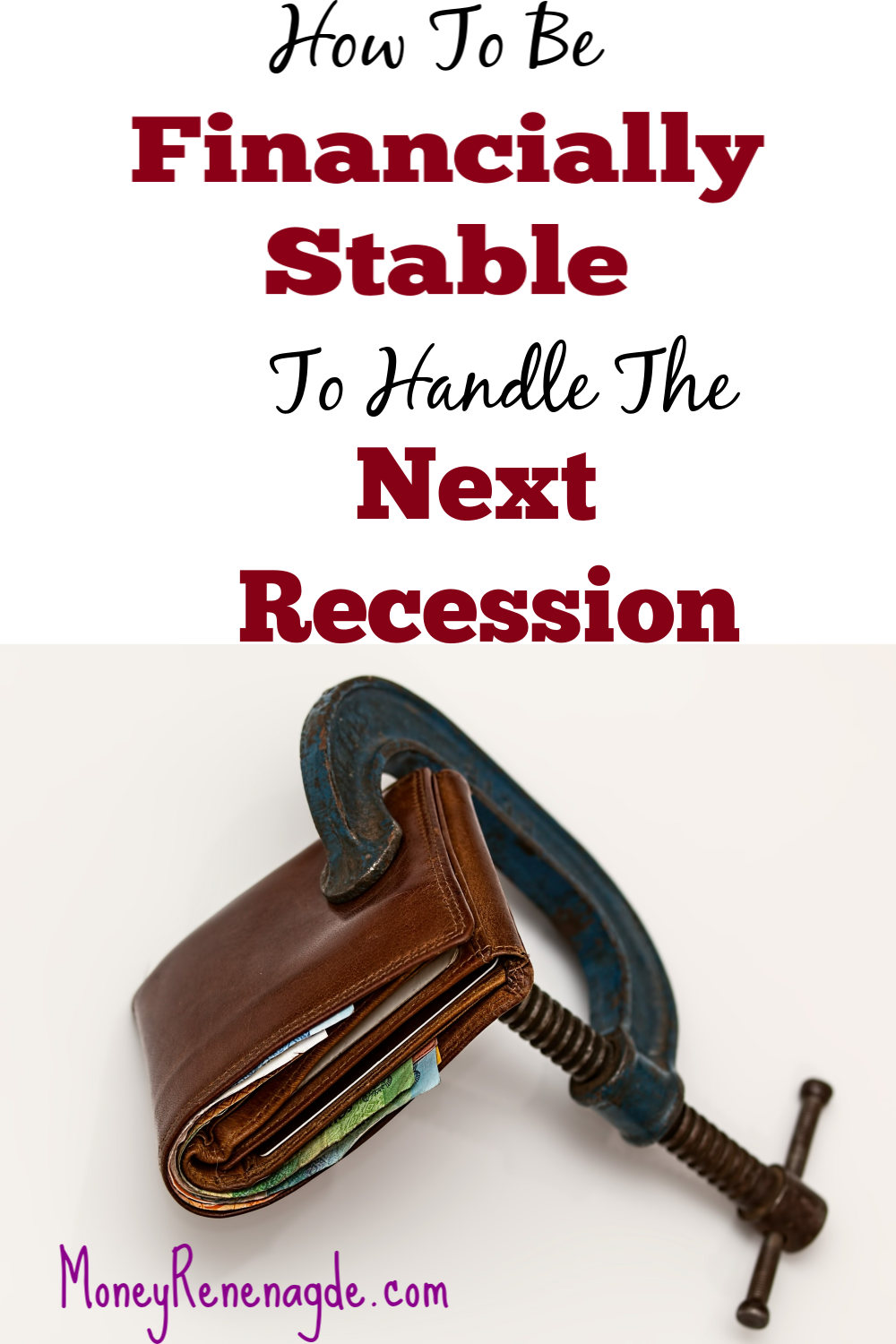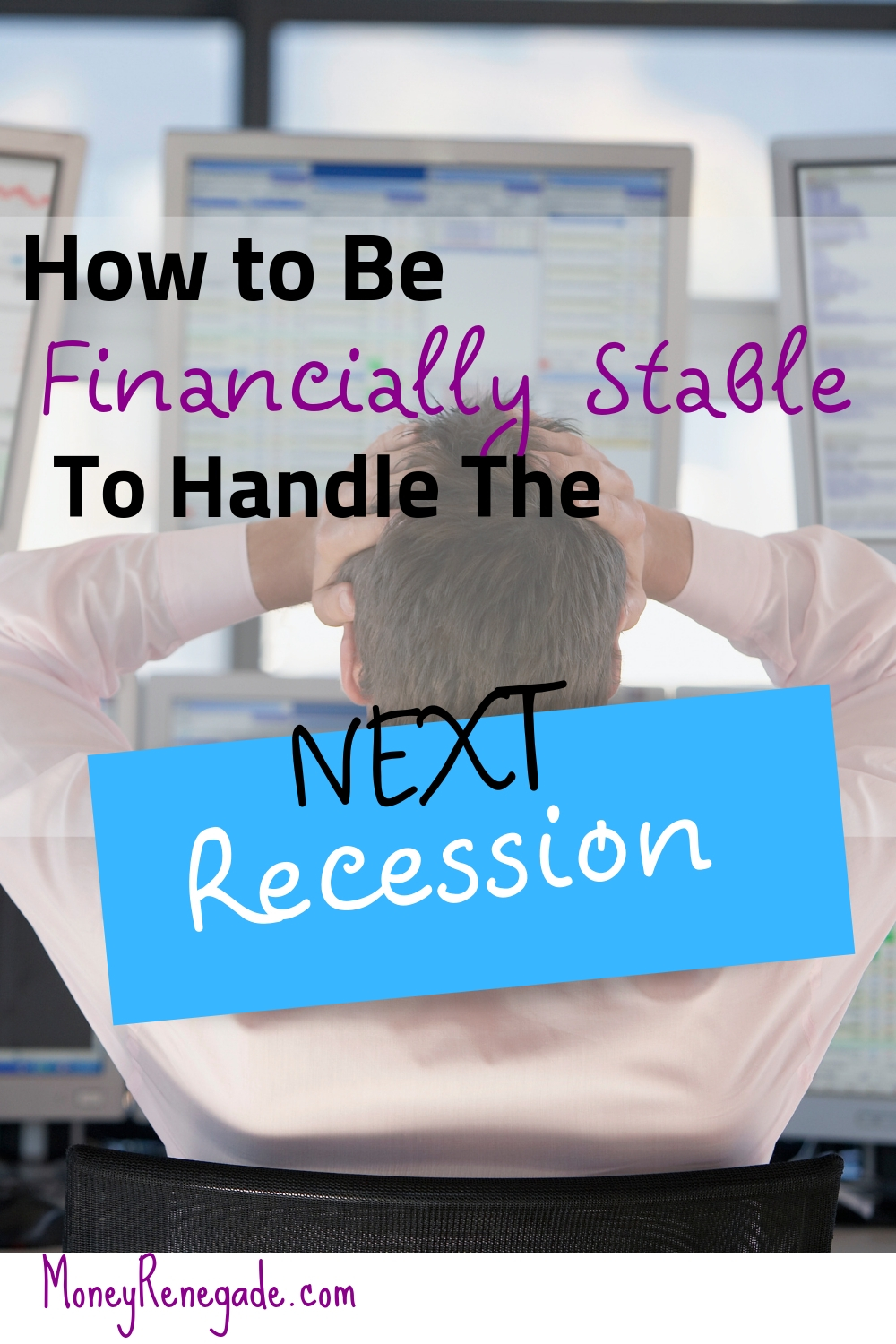This post may contain affiliate links. Please see Disclosure and Privacy Policy at bottom of page.

Are you financially stable enough to handle a recession? Since the early 1900’s the average time between recessions has been about 57 months, or 4 years and 9
You can’t time a recession, but you can prepare for what is inevitable.
Get your job in order
At
Learn new skills
Learn new skills in sectors or industries of the economy that are forecast to grow and flourish in the coming years and decades. Getting additional education or certifications will help with a new job, but also to possibly keep the job you have.
Are you in an industry that is likely to have lay-offs when the economy turns south? Jobs that are in retail, manufacturing, food service or hospitality are often the first to lose their jobs. Although it is not unheard of for jobs people think of as being stable to get the pink slip too. Even teachers and police officers can get let go if things are bad enough.
Get your resume polished.
Now is the time to update your resume and be sure that it has everything on it that will help you land a new job. Updating it will make it more relevant to the times. If it has been a while you might not even have a resume.
If you work somewhere that you think might be more likely to have lay-offs get a new job now. A word of caution here, if the new place you go to ends up laying people off too you might be the first to go since you are new there. If you change jobs now be sure that it really is a more secure job.
Change Jobs
If you decide to change jobs now or not you need to connect with
Get a side job now
This could be your own business or even delivering pizza. Have something that you can rely on for some income while you look for a new job. At least you won’t be
Get your Finances in order
For investment and retirement purposes: Check with your financial planner, or (panther if you prefer lol), on a quarterly or monthly basis to gauge and adjust your portfolio as necessary. The markets will remain very volatile in the short and medium term.
As a general guideline you want to diversify with stocks, bonds, mutual funds or index funds and spread them across different sectors of the market. Remember that the farther off you are from retirement the more risk you can tolerate. Don’t try to time the market and lose more money by pulling out of the market. Be prepared to buy when everyone else is selling.
If you think that you might need credit while the recession is going on you should apply for a line of credit now. When things are good and the banks are flush with cash, they are willing to lend. Unfortunately, they don’t want to lend in a recession. Get it now to be prepared. No one says you have to use it.
Start living below your means.
Cut all unnecessary expenses. Stop eating out all the time, mindless online shopping and have subscriptions for things you don’t really need.
Make a budget and stick with it. To keep this simple, figure out what you have coming in and what must go out. Add in for things that recur annually or semi-annually or anything else that is not a typical monthly expense. Don’t forget to leave a little fun money. After all there isn’t a recession yet, but at least you know there is something else that could be cut later on.
Cut costs where you can.
Call to get a deal on your phone or cable. Or just cut the cable
Maybe you can trade in your vehicle for a cheaper one. Remember that scrimping out on the car will end up costing you more in the long run for sure. Repair costs can add up. So make sure to have the newest reputable car that you can afford. Sacrifice other things to keep the better vehicle. You won’t regret it.
Start paying off your debt.
Consider getting a zero interest rate card to transfer credit card debt to pay it off faster. Make additional payments to credit debt when possible. If you are in the position you could also make additional payments to your mortgage and car. Although the order of payoff should be the credit cards since they take the most interest. Then the car since you will be able to pay the car off before the house and that will eliminate a payment that you need to make every month.
Start increasing your savings.
With the money that you should have saved by cutting back and eliminating expenses you should put that money into an emergency fund. When building an emergency fund you ideally want to get up to six months of living expenses saved. This should be more if your income is variable now.
Get your life in order
Be flexible.
You may have to go into a different industry to get work and that is okay. Don’t be too hard on yourself. In a down economy, you don’t always have a choice and must do what you have to.
Learn to deal with stress.
Being uncertain of your future can lead to an increase in stress levels. This will make everything harder when you are trying to deal with finding a new job. A very simple technique is to take a deep breath and slowing let it out. Do this a few times and it should help in the moment. It won’t cure everything, but it will help a little.
Prepare your family for an increase in stress.
Let them know what is going on, what to expect and how they can help. Find cheap or free ways to spend time together that will help you get through it together.
A recession doesn’t need to destroy you and your family. You can prepare. Decide what you can do now that will set you up for success when the economy tanks. You will thank yourself for preparing now. Yes, it isn’t the easiest to do. Getting a second job may seem pointless now, but if it does nothing else than to get your debts paid off now then it will be well worth it. It will help to make you more financially stable to handle the next recession.
A recession doesn’t need to destroy you and your family. You can prepare. Decide what you can do now that will set you up for success when the economy tanks. You will thank yourself for preparing now. Yes, it isn’t the easiest to do. Getting a second job may seem pointless now, but if it does nothing else than to get your debts paid off now then it will be well worth it. It will help to make you more financially stable to handle the next recession.
